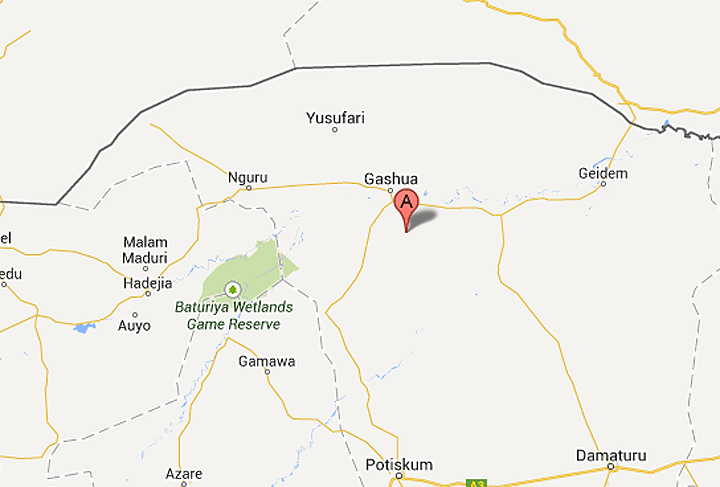LAGOS, Nigeria – Boko Haram assaulted three villages in northern Nigeria, killing 48 people, residents said Wednesday, hours after twin bombings claimed at least 118 lives in this central city in an attack the government blamed on the Islamic extremists.

One of the villages attacked between Tuesday night and early Wednesday is near the town of Chibok, where more than 300 schoolgirls were kidnapped last month by Boko Haram, according to residents and a state intelligence agent who spoke on condition of anonymity because he is not authorized to give information to reporters.
READ MORE: Outrage grows over kidnapped Nigerian girls
Apagu Maidaga of Alagarno said residents of that village hid in the bush and watched while the extremists set ablaze their homes of thatch-roofed mud huts.
“We saw our village up in flames as we hid in the bush waiting for the dawn; we lost everything,” he told The Associated Press in a telephone call.
In Jos, where at least 118 people were killed in twin bomb attacks Tuesday on a bustling bus terminal and a market, residents joined rescue workers armed with body bags in looking for missing loved ones.
Most victims were women and children vendors, said Mohammed Abdulsalam of the National Emergency Management Agency.
“We expect to find more bodies in the rubble,” Abdulsalam said.
“Allahu akhbar!” some young Muslim men yelled provocatively at an AP photographer near the scene, using the war cry of Islamic militants that means “God is great” within hearing of soldiers at a checkpoint.
Jos is tense with fears the attack blamed on Islamic extremists could inflame religious rivalry. The city in central Nigeria sits on a volatile fault line dividing Nigeria’s mainly Muslim north from the predominantly Christian south and has been a flashpoint in the past for deadly conflict between adherents of the two religions. Boko Haram, the group suspected in the attack, wants to impose an Islamic state under strict Shariah law in Nigeria, though half the country’s 170 million people are Christians.

Get breaking National news
Officials in at least three other central and central-north states have suggested the extremists are feeding into tribal and religious tensions to spread the insurgency from their stronghold in Nigeria’s northeast into an area where thousands have been killed in recent years in disputes over land, water, religion and tribe.
READ MORE: Canada joins effort to free Nigerian schoolgirls
At the Jos marketplace, earthmovers demolished buildings weakened by the bomb blasts and fires and moved heavy debris, allowing rescuers to search for more bodies.
Gloria Paul was among a handful of people searching for loved ones at Bingham University Teaching Hospital. She was looking for her husband but all she had found so far was his car parked near Terminus Market, its windows all shattered. Dozens of wailing people crowded outside the morgue at the Jos University Teaching Hospital next to the bomb site, waited their turn to see if family members were among the dead.
Security forces cordoned off the area of mounds of rubble, burned-out vehicles and razed buildings with the debris of panic scattered around – a sandal here, a hat there. Exploded mangoes and pineapples rotted in the sun, their sickly sweet smell mixing with the stench of rotting human flesh.
A charred engine block was all that remained of the grain-filled truck that held the second bomb.
Police anti-bomb squad officers investigated a crater left by one of the blasts.
The search for survivors was halted Tuesday night by fires ignited in buildings by the massive blasts that were heard miles (kilometres) away. Firefighters fought through the night to douse the blazes that collapsed buildings, Abdulsalam of the national emergency agency told The Associated Press in a telephone interview.
READ MORE: 2 blasts hit bus station in central Nigeria city; at least 118 dead
At least 118 bodies were delivered to hospital morgues Tuesday, and 64 people were hospitalized, he said.
President Goodluck Jonathan tried to assure Nigerians their government “remains fully committed to winning the war against terror.”
Nigerian army spokesman Brig. Gen. Olajide Laleye also insisted victory was close Wednesday, dismissing reports of troops suffering from low morale and lack of basic equipment including bullet-proof vests.
“I make bold to say that the Nigerian Army is steadily and surely reversing the ugly menace of terrorism and insurgency in the northeast part of this great nation,” he said at an army recruiting campaign.
But extremist attacks have increased in frequency and deadliness this year, with more than 2,000 killed in the insurgency compared to an estimated 3,600 between 2010 and 2013.
Boko Haram’s 5-year-old uprising has grabbed international attention with the abduction of nearly 300 schoolgirls who the extremists are threatening to sell into slavery.
On Monday a car bomb at a bus station killed 24 people in the Christian quarter of the northern Muslim city of Kano, where police later defused another massive car bomb. Two separate bomb blasts in April around another bus station, in the nation’s capital of Abuja, killed more than 120 people and wounded more than 200.
The attacks on Monday and Tuesday took place after regional and Western leaders pledged “total war” on the militant group at a weekend summit in Paris.
The U.S. Embassy in Abuja condemned Tuesday’s attack and said the United States is helping Nigeria to “grapple with violent extremism.”
It also urged calm in Jos. “We have seen reports that tensions are high in Jos, and we join the voices of those who are appealing for calm.”
—
Faul reported from Lagos, Nigeria. Associated Press journalists Sunday Alamba in Jos, Haruna Umar in Maiduguri, Nigeria and Bashir Adigun in Abuja, Nigeria contributed to this report.







Comments